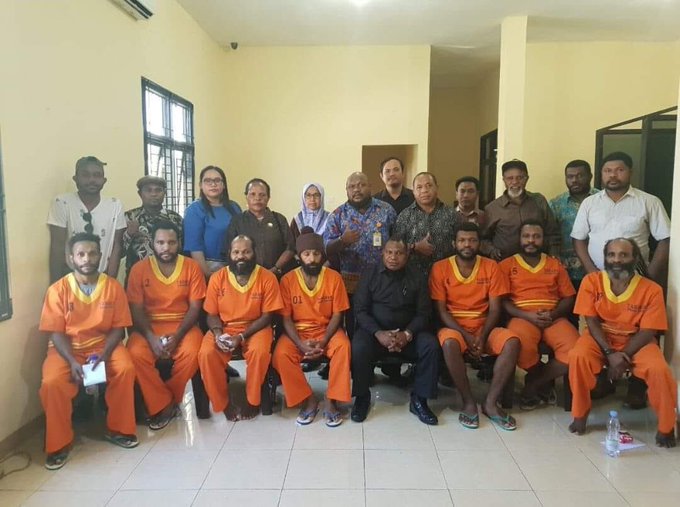The first thing you notice about Veronica Koman (LLM ’19) are her eyes. Cool and determined, they exude razor-sharp focus as she talks about her advocacy and its personal cost over recent months.
“Now, I am a fugitive,” says Veronica, an Indonesian human rights lawyer who graduated from The Australian National University (ANU) in July.
“There’s an article saying I am state enemy number one in Indonesia. It’s been intense.”
In September, Veronica was charged under Indonesia’s controversial electronic information and transactions law for exposing human rights abuses and advocating self-determination in West Papua. If found guilty, she faces up to six years in jail.
“I knew this day was coming sooner or later. I expected this,” she says.
Although her advocacy has been mired in challenges, Veronica received a measure of vindication on 23 October by winning the 2019 Sir Ronald Wilson Human Rights Award.
Presented each year by the Australian Council for International Development, the award is given to an individual or organisation who has made an outstanding contribution to advancing human rights.
“I dedicate this award to the victims of the crackdown that began in late August in West Papua, especially the dozens who have died at the hands of security forces and the 22 political prisoners charged with treason,” she says.
“I hope this year's award will raise awareness in Australia about human rights abuses suffered by West Papuans and the decades-long denial of their fundamental right to self-determination.”
 |
Veronica’s experience as a refugee lawyer led to her being diagnosed withpost-traumatic s tress disorder in late 2015. |
Speaking truth to power
It is difficult to obtain verified information from West Papua, an Indonesian region where deadly clashes have intensified over the past decade. Restrictions on press freedom and internet blackouts are common.
Veronica has sought to fill the information void by sharing eyewitness accounts, photos and videos of protests on social media.
And the figures, like the footage, are shocking.
“The death toll now is at 53 in just two months, with more than 100 civilians injured and 60,000 others displaced. It is a humanitarian crisis, but the press ban means it isn’t getting enough coverage,” she notes.
Veronica’s advocacy has made her an online target for trolls, who have orchestrated what she describes as “a Trumpian, fake-news” campaign against her to “confuse people and create distrust”. On 11 October, a BBC-Australian Strategic Policy Institute investigationrevealed a network of pro-government bots was behind the attacks.
“These (attacks) form part of the information war on West Papua. No press freedom and propaganda creates total distortion of information. I too didn’t know about West Papua for many years, but when my eyes were open it became my personal mission. That’s why I share videos of atrocities – because it destroys the Indonesian Government’s disinformation campaign,” she explains.
Away from social media, Veronica also faces real-world obstacles; Indonesian authorities have threatened to freeze her bank account and revoke her passport, leaving her vulnerable to arrest and extradition overseas.

Veronica has remained defiant in the face of online abuse and what she calls 'politically motivated' charges.
Finding strength in the struggle
While pleased to return to her “home” at ANU College of Law during a visit to Canberra on 15 October, Veronica’s mission was to make her voice heard at Parliament House.
“I hope the Australian Government can do more for West Papua because we are seeing the darkest period in 20 years. As a minimum, Australia should push for access to West Papua for UN Human Rights officials and journalists,” she says, adding that scholarly debate is also critical to finding solutions to the crisis.
“Australia is a leader in the Pacific region. It should take up its role to push for action, because human rights should prevail over any bilateral treaty. What we are seeing now is a humanitarian crisis.”
It’s a crisis that requires diplomatic pressure and international to solve – both pillars of Veronica’s advocacy.
Seven West Papuan prisoners of conscience who were moved to Borneo from Jayapura two weeks ago.
The transfer process was in breach of criminal procedure law.
Lawyers finally got to visit them yesterday.
110 people are talking about this
She credits her studies at ANU College of Law for giving her the knowledge and skills to work with international institutions and their respective legal frameworks on the global stage.
“I think my ANU Law studies have really helped me. The foundation I gained from International Security Law and International Humanitarian Law, both of which are applicable in the West Papua conflict, has allowed me to consider the key points that need to be communicated to the UN and other humanitarian organisations,” she says.
Like any good lawyer, the driving force behind Veronica’s work is the people she represents. The importance of staying committed to the cause is reinforced each time she learns about developments on the ground, is interviewed by journalists or, as her ANU graduation offered in July, celebrates a brighter moment with allies in Australia.
 |
Veronica with Papuan graduand, Ronny Ato Buai Kareni (MDipl '19), at ANU on 19 July 2019. |
Asked her advice to law students aspiring to follow in her footsteps as human rights advocates, Veronica notes a main source of strength is often closer than you might think.
“I think students should go forward with their passion because the people whom you advocate for will show you such courage and resilience. It pushes you to keep going.
“Personally, I feel privileged because I see and learn from the West Papuans, who are very brave. It’s just so …”
Her eyes dart in search of the right word.
“… contagious.”



